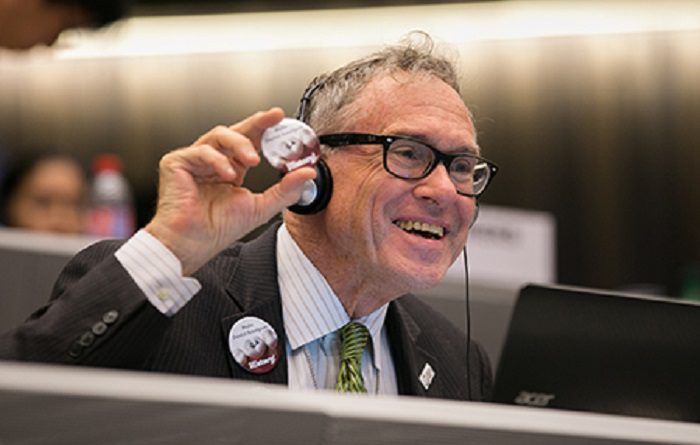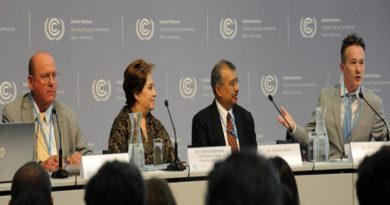World Alliance sets stage for mercury-free dentistry in East African countries
Photo caption: Charlie Brown, President of World Alliance for Mercury-Free Dentistry
The World Alliance for Mercury-Free Dentistry (WAMFD) through her non-government organisations in Kenya, Uganda, Tanzania and Ethiopia among others has set stage for mercury-free dentistry in the region in 2024 particularly the phase out of amalgam use.
Encouraged by the signing and ratification/accession of the Minamata Convention on Mercury, a global treaty that seeks to make mercury history which has been ratified by government of 42 countries in Africa out of the 54 countries, the largest so far from any bloc of the Convention with the most recent one by Kenya in September 2023, the group has set ambitious plan for the year.
Recall that the WAFMD recently received full funding for her campaign activities for the year from the North American philanthropist and scientist, Dr. Myron Wentz, to sensitize governments, dental practitioners and key stakeholders in several African countries to end amalgam use.
At a virtual session held on Tuesday, April 2, group leaders from Kenya, Uganda, Tanzania and Ethiopia brainstormed on ways to phase down and phase out the use of dental amalgam within the provisions of the Minamata Convention on Mercury.
Attended by President of the World Alliance for Mercury-Free Dentistry, Charlie Brown, the session was moderated by Kenya Programmes Coordinator, Centre for Environment Justice and Development, Griffins Ochieng.
After the round of introductions by Brown and Ochieng, Mary Atugonza of the Network on Sound Management of Chemicals (NESMAC) in Uganda disclosed plans by her organisation and colleagues to engage dental practitioners and associates on dissemination on lessons learnt to other developing countries by defining further phase-down approach, collaborate with local government representatives, simplify dental amalgam in local languages, and strengthen awareness of the general public on dental amalgam.
Robert Tumwesigye, also from Uganda who works closely with Atugonza, said: “This year, we plan to meet with the National Economic Management Authority, Ministry of Health and Drugs Authority to review the regulations on chemicals which have a big component on dental amalgam, especially phasing out dental amalgam. So, we have planned focused meetings and awareness campaigns to ensure that dental amalgam is phased out in Uganda.”
On her part, Tanzanian, Dora Swai, disclosed that her group has been working with “the consumer association for quite a while – since we started our campaign – and we plan to continue to do that.”
According to her, “we have the Regulations signed by government since 2020 to prohibit use of amalgam in Tanzania”, but that it (amalgam) is still being used especially in adults.
She added: “Tanzania is surrounded by eight countries, from where amalgam may illegally come into the country. Educating the consumers is very important, and we work with the Central Medical Store to educate on existing convention and guidelines relating to mercury-free dentistry.”
Another Tanzanian, Benard Kihiyo, who is with the Consumers’ Association, submitted: “We observed that we still have problems with the use of amalgam mostly when it comes to our dental clinics in rural and border areas. We intend to interact with the MSD, and find out if there is importation of amalgam, and unravel the sources of amalgam entry into the country. The plan is to end amalgam use by 2030. There should be efforts toTanzania andely with Customs and the Central Medical Store, harmonise our policies on amalgam with the East African Trade Block, hold sensitisation meetings in Tanzania, and work together with SADC countries.”
Acknowledging Kihiyo’s statements, Swai underscored the need “to do a lot of awareness and sensitisation with consumers so that they can be enlightened to say no to amalgam”.
Daniel Maina of the Kisiwani Conservation Network, Mombasa, Kenya, stressed that the body has commenced discussions with the National Dental Association, Mombasa Chapter. He added that they would share data/information regarding the disposal of amalgam.
Speaking further on Kenya’s endeavour, Ochieng disclosed that the Kenyan ratification came into force last year, and that his organisation has been engaging with the Ministry of Health on the Oral Health Policy, and to promote mercury-free dentistry.
“We have formed a technical working group on the implementation of policies and to fashion out a national plan to phase out dental amalgam in Kenya.”
Dental amalgam is a tooth filling material that is approximately 50% mercury, a highly polluting neurotoxin. Today, countries around the world are phasing out the use of amalgam, and phasing up the use of mercury-free alternatives.
The World Alliance for Mercury-Free Dentistry is working with governments and organisations to phase down amalgam use in every region.




